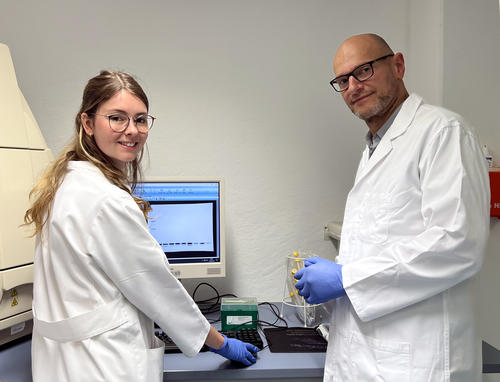Through renewed approval: DFG funds "Epithelial Barrier" research group with a total of over one million euros
Researching the effect of ingredients of the non-psychoactive cannabidiol on the body in the "Epithelial Barrier" working group: PhD student in Veterinary Physiology, Elisa Böhm and Prof. Dr. Salah Amasheh
News from Jul 01, 2024
In the course of the legalization of cannabis in Germany, there is a great need for research into the effects of the ingredients on the body. For the non-psychoactive cannabidiol, the "Epithelial Barrier" working group led by Professor Salah Amasheh from Freie Universität Berlin has already been able to identify anti-inflammatory properties of the active ingredient cannabidiol that promote intestinal health at the molecular level. On this basis, further research has now been recognized by the German Research Foundation (DFG) with a further individual grant of 388 000 euros.
The project AM141/15-1 "Cannabinoid and inflammatory effects in pig intestinal models" by the biologist and research group leader at the Institute of Veterinary Physiology at Freie Universität Berlin, Prof. Dr. Salah Amasheh, will start on July 1, 2024 and is now funded by the DFG with 388 000 euros. It thus successfully ties in with the ongoing funding of the project AM141/14 "Functional and molecular-biological characterization of the epithelial barrier of the follicle-associated epithelium of porcine Peyer's patches" in the amount of 651 000 euros (duration from 2016 to 2024). The research team was able to establish the basis for cellular and molecular biological inflammation research at the School of Veterinary Medicine.
The results of the research work to date have been published in the renowned journal "Materials Today Bio", among others: the researchers have shown that cannabidiol, one of the main active ingredients of the cannabis plant, inhibits the inflammatory reactions taking place in cells by downregulating disease-associated receptors and simultaneously strengthening the natural, sealing protective function of body surfaces. This results in a variety of therapeutic and health-promoting aspects that open up new medical applications. The published results already provide valuable insights into cell processes that can be used, for example, in the treatment of inflammatory bowel diseases, but also for general health-promoting purposes.
"The successful analysis of the cannabidiol effect represents an important milestone for us. The question now is whether other ingredients support or otherwise influence the anti-inflammatory and gut health-promoting properties," emphasizes Prof. Salah Amasheh.
The continuation of the project, which has now been made possible by the DFG, gives hope for further insights into the mechanisms of action and possible applications of this medicinal plant, which has been used for thousands of years.
